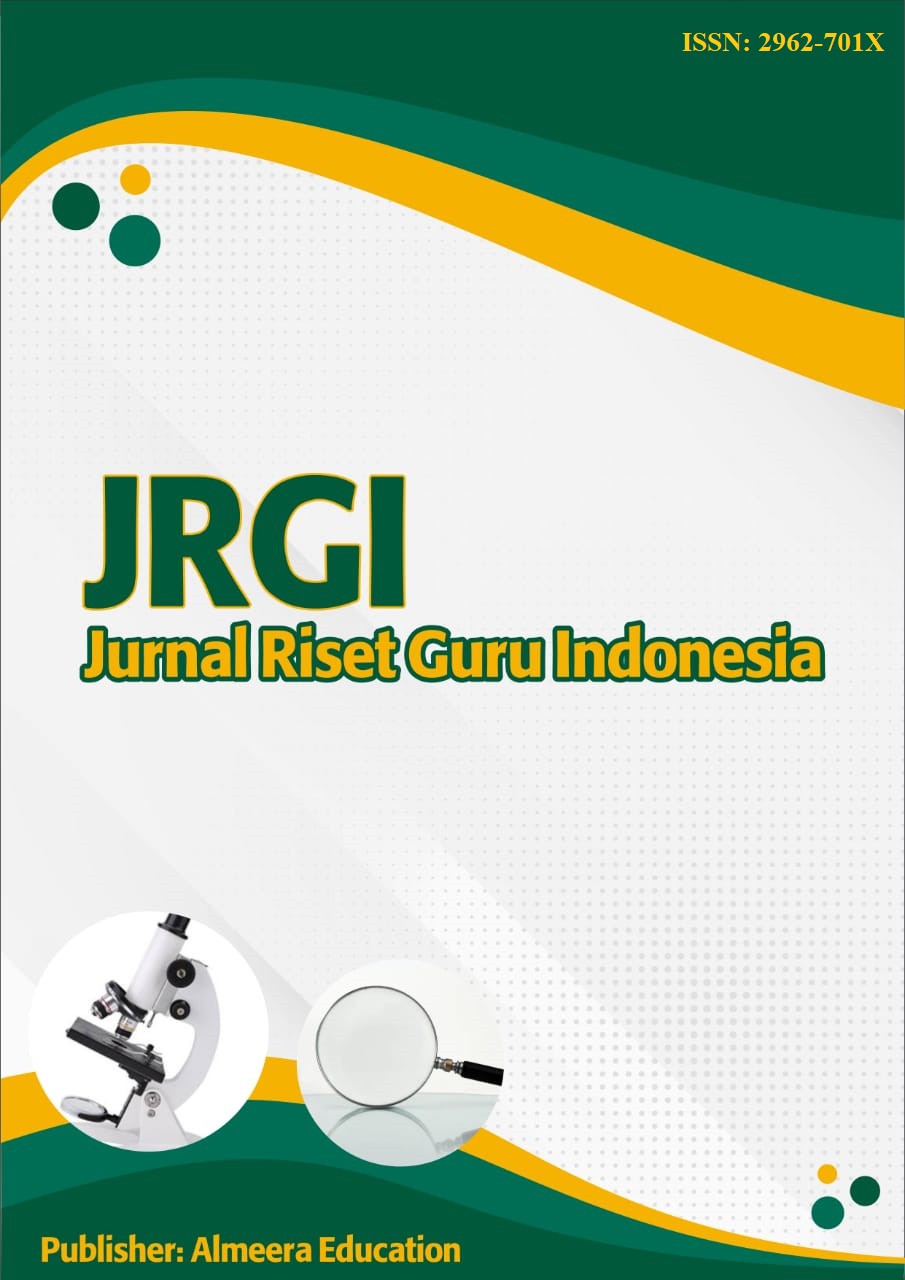STUDI KOMPARASI MOTIVASI DAN HASIL BELAJAR SISWA PONDOK PESANTREN DENGAN SISWA LUAR PONDOK PESANTREN
DOI:
https://doi.org/10.62388/jrgi.v3i3.509Kata Kunci:
Comparative studies, Motivation to learn, Learning outcomes, Islamic boarding schoolAbstrak
This research aims to determine the differences in motivation and mathematics learning outcomes of Roudlotul Ulum Randuagung Islamic Middle School students who live in Islamic boarding schools and outside Islamic boarding schools. This research is a type of comparative research with a quantitative approach. The variables in this research consist of: learning motivation of students living in Islamic boarding schools (X1.1), learning motivation of students living outside Islamic boarding schools (X1.2), learning outcomes of students living in Islamic boarding schools (X2.1), learning outcomes of students living outside Islamic boarding schools (X2.2). The population in this study were all students at Roudlotul Ulum Randuagung Islamic Middle School, totaling 68 students. This research uses a comparative quantitative approach and uses normality and homogeneity test statistics. Based on the research results obtained, the results of calculations using the Independent Sample t-test with SPSS 25 on student learning motivation produced a Sig 2 Tailed value of 0.142 > 0.05, meaning that there is no difference in the learning motivation of students who live in Islamic boarding schools and students who live in Islamic boarding schools. House. Meanwhile, the results of calculations using the Independent Sample t-test with SPSS 25 on student learning outcomes produced a Sig 2 Tailed value of 0.908 > 0.05, meaning there is no difference in the learning outcomes of students who live in Islamic boarding schools and students who live at home.
Referensi
Fauzi, Moch., et al. (2021). Perbandingan hasil belajar connected mathematics project dengan pembelajaran konvensional pada siswa sma 1Moch. Fauzi, 2Fahmi Abdul Halim, 3Ibnu Toib. Jurnal AKSIOMA: Jurnal Matematika dan Pendidikan Matematika. https://doi.org/10.26877/aks.v12i3.10148
Sape, H. (2024). PEMBELAJARAN MATEMATIKA MELALUI PENERAPAN PENDEKATAN ROGERS PADA SISWA SEKOLAH MENENGAH ATAS. Jurnal Penalaran Dan Riset Matematika, 3(1), 24–32. https://doi.org/10.62388/prisma.v3i1.423
Sholikhah, Aniatus, et al. (2023). Pengaruh pendekatan pendidikan matematika realistik (PMR) berbasis pembelajaran differensiasi terhadap koneksi matematis SD kelas 1. Jurnal AKSIOMA: Jurnal Matematika dan Pendidikan Matematika. https://doi.org/10.26877/aks.v14i3.17206
Siagian, M. D. (2016). Kemampuan koneksi matematik dalam pembelajaran matematika. MES: Journal of Matematics Education and Science2, 2(1), 58–67.
Siregar, S. (2023). Statistik Parametrik Untuk Penelitian Kuantitatif. Bumi Aksara.
Sugiyono. (2018). Metode Penelitian Kuantitatif. Alfabeta.
Sugiyono. (2019). Statistika Untuk Penelitian. Alfabeta.
Suharni, & Purwanti. (2018). Upaya meningkatkan motivasi belajar siswa. G-Couns: Jurnal Bimbingan Dan Konseling, 3(1), 131–145.
Suharsaputra, U. (2012). Metode Penelitian : Kuantitatif, Kualitatif dan Tindakan. PT Refika Aditama.
Suharsimi, A. (2006). Prosedur Penelitian Suatu Pendekatan Praktik. PT Asdi Mahastya.
Sulis Regita Cahyani, & Warmi, A. (2023). Analisis Motivasi Belajar Matematika Siswa Sma Ketika Kembali Belajar Tatap Muka. EduMatSains : Jurnal Pendidikan, Matematika Dan Sains, 8(1), 8–20. https://doi.org/10.33541/edumatsains.v8i1.4576
Sumardi. (2020). Teknik Pengukuran dan Penilaian Hasil Belajar. CV Budi Utama.
Susanti, L. (2020). Strategi Pembelajaran Berbasis Motivasi. Alex Media Komputindo.
Syaadah, R., Ary, M. H. A. A., Silitonga, N., & Rangkuty, S. F. (2023). Pendidikan Formal, Pendidikan Non Formal Dan Pendidikan Informal. Pema (Jurnal Pendidikan Dan Pengabdian Kepada Masyarakat), 2(2), 125–131. https://doi.org/10.56832/pema.v2i2.298
Syahputri, A. Z., Fallenia, F. Della, & Syafitri, R. (2023). Kerangka berfikir penelitian kuantitatif. Tarbiyah: Jurnal Ilmu Pendidikan Dan Pengajaran, 2(1), 160–166.
Warsah, M. U. I. (2021). Psikologi Pendidikan. CV Budi Utama.
Yusuf, M. M. (2010). Pengaruh Cara Dan Motivasi Belajar Terhadap Hasil Belajar Programmable Logic Controller (Plc) Siswa Kelas Iii Jurusan Listrik Smk Negeri 5 Makassar. Jurnal MEDTEK, 1, 1–6.
Zubairi. (2023). Meningkatkan Motivasi Belajar dalam Pendidikan Agama Islam. CV Adanu Abimata.
Rachmawati, A. (2024). Studi Komparatif Prestasi Belajar dan Tingkat Kemandirian Belajar Matematika Siswa Pondok dan Tidak Pondok Kelas X MA Ma’ahid Kudus (Doctoral dissertation, IAIN Kudus).
Salsabila, H., & Nalim, Y. (2024). STUDI KOMPARASI PRESTASI BELAJAR SISWA ANTARA SISWA YANG TINGGAL DI PONDOK PESANTREN DAN SISWA YANG TIDAK TINGGAL DI PONDOK PESANTREN. Dahzain Nur: Jurnal Pendidikan, Keislaman dan Kemasyarakatan, 14(1), 55-61.


